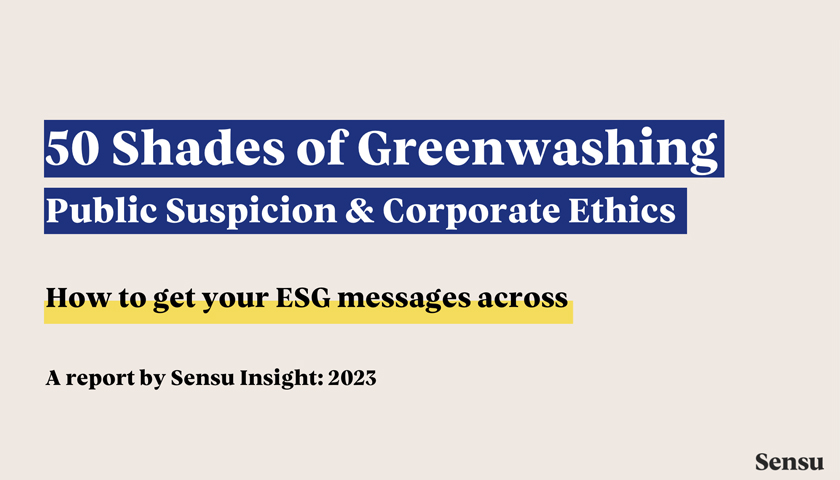Accusations of greenwashing, sportswashing and corporate virtue signalling are on the rise. Collectively, the global profile for these terms has increased 46% over the last year, with media mentions up by 68% over the same period.
While this might lead some organisations to seek to avoid ESG communications (‘greenhushing’ is another trend being reported), in reality there is unavoidable pressure to explain and justify ESG credentials – from investors, customers, employees, and media among others.
It’s never been more important to understand how ESG communications are being received.
Greenwashing Research Report: Contents and Key Findings
In this report, Sensu reveal the findings of a survey showing how the public perceive such communications, what they believe and who they trust, which sectors are seen to be succeeding and those that need to work harder to be believed. We also look at the impact and importance of communicating ESG effectively, how consumers and employee behaviours are being influenced by perceptions of corporate ethics and the scale of the issue for UK businesses.
What did we find?
1. There’s considerable public suspicion about corporate ESG claims
- Less than a quarter (23%) of the public take ESG claims at face value.
- 14% of people say they typically disbelieve claims. 30% expect the claim to have been exaggerated, 71% don’t think that the claim is likely to have been verified or checked by an independent expert or regulator.
2. Some sectors are much less likely to be believed
- There is a clear divide in those sectors where we place our trust on ESG matters. Those most likely to be believed are supermarkets and major retailers, technology companies and food or drink manufacturers.
- We are much less likely to trust claims from airlines, car manufacturers and fashion brands.
3. The public trust independent experts
- The commentators most likely to believed are bodies with expertise in ESG matters. Their opinion is trusted more than what is reported in the media or commentary on social media.
- 62% said they were likely or very likely to believe commentary from independent experts such as the Energy Saving Trust or similar organisations. Next most influential were international organisations such as the UN (56% likely or very likely to believe), and pressure groups such as Greenpeace or Friends of the Earth (55%).
- Of the media or social media influencers, national broadcast media reports carry most weight (53%) and national ‘broadsheet’ media (43%).
4. Incidents of perceived greenwashing are widespread and damaging
- Just under a quarter of employees (23%) said that the organisation for which they work had been accused of greenwashing, with 8% saying that this had happened multiple times.
- In just under half of these reported cases, respondents could point to specific harm caused to their organisation. This may be simply a damaged reputation; for example negative customer reviews (15%), customer complaints (13%), or loss of stakeholder trust (7%).
- In other cases, they could point to immediate financial loss; for example customers leaving in favour of a competitor (9%), financial losses (9%), weakened share value (6%), loss of market share (4%) or loss of investment (3%).
- 93% of consumers said that they had seen, what they believed to be, an example of greenwashing within the last month. Most common were organisations who claimed to be sustainable without any facts or figures to justify the claim (33%). This was followed by misleading advertising (32%) or false or exaggerated recycling claims (30%).
- 59% of consumers say that they have changed their behaviour in some way because of perceived examples of greenwashing. Most common was to reduce the amount of money spent with that organisation (23%), with 15% saying that they have boycotted a brand entirely as a result or switched to an alternative provider with better eco credentials (13%).
5. The public want greater transparency
- 89% of the public said that they cared about the environmental stance of businesses and brands. 86% wanted an increase in their level of transparency on environmental matters.
- Only 8% agreed that most businesses currently do enough for the environment.
Read and share our full research below to find out the six lessons of effective ESG communications.
Fill in a Contact Form to learn more about tracking corporate reputation.
